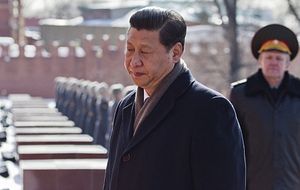Kerry Brown just noted for The Diplomat that President Xi Jinping is far more willing to speak out than his more reserved predecessor, Hu Jintao. China’s domestic media have not been hesitant to draw attention to this fact either – Xi’s remarks and speeches garner widespread coverage. In fact, People’s Daily online just carried a story highlighting 12 “hot phrases” (热词) used by President Xi over the past few years. Hong Kong University’s China Media Project provided an English translation of the bulk of the article.
The list of catch-phrases is as notable for what’s not included as for what is included. Of the 12 “hot phrases,” only one touches on foreign policy – “one belt and one road,” a reference to Xi’s proposal for a Silk Road Economic Belt and Maritime Silk Road. The phrase “new type of great power relations” – arguably Xi’s first catchphrase, as it emerged during a 2012 visit to the U.S. while he was still vice president – doesn’t even make the list. So what does make People’s Daily’s list of 12 “hot phrases” used by President Xi?
As the China Media Project points out, many of these “hot phrases” are intended mostly to showcase Xi’s folksy style, both in terms of phrasing and subject matter. He uses Internet slang to describe government work styles; he tells Chinese youngsters not to pull all-nighters. The message is that Xi is both relatable and concerned with the issues that dominate Chinese people’s daily lives. But intermixed with these down-to-earth sayings are examples that hint at how Chinese media wants the people to think of their leader.
Unsurprisingly, the “Chinese dream” is Xi’s number one “hot phrase.” This concept has percolated down to touch on every single aspect of Xi’s governance of China – anti-corruption, economic reforms, even foreign policy. All of these initiatives are loosely tied to Xi’s vision of realizing the Chinese dream: “the great rejuvenation of the Chinese people.”
Xi, as the originator of the phrase, now has a monopoly on defining it. It’s up to Xi to decide which policies and actions are to the benefit of the “Chinese dream” and which are not. Environmental protection, for example, has been folded into the Chinese dream (as seen by another of Xi’s “hot phrases,” “APEC blue”). Turning away from the CCP’s definition of Chinese values, however, is definitely not part of the Chinese dream. Thus another “hot phrase” involves Xi telling students, “In life, you need to get the buttons right from the start” – part of a longer lecture emphasizing that if young Chinese embrace the wrong values, all of society will suffer. It’s a short step from there to the recent campaign for ideological education at China’s universities.
Many of Xi’s other “hot phrases” deal generally with the anti-corruption campaign. Xi’s famous exhortation to battle “tigers and flies” made the list, as did a lesser known pronouncement urging officials to self-reflect (“Look in the mirror, attend to your wardrobe, wash yourself clean, and cure your ailments”). Yet while Xi is unafraid to tackle flaws in China’s government, he insists on absolute Party leadership. He emphasized the importance of the Party holding the “knife handle” (political, legal, and military power). Xi also gave a Facebook-style “like” to the Chinese people for supporting the Party.
We often discuss Xi’s ambitious foreign policy vision for China, and rightfully so. But it’s important to remember that – as in any country – it’s Xi’s domestic policies that will make or break his legacy. These “hot phrases” are a handy catalog of what initiatives Chinese state media wants to showcase – anti-corruption, environmental protection, economic reforms – in addition to highlighting Xi’s down-to-earth image. It’s telling that the one foreign policy initiative that made the cut involves economics and China’s “neighborhood diplomacy” – the aspects of foreign policy most likely to directly influence the average Chinese citizen.

































